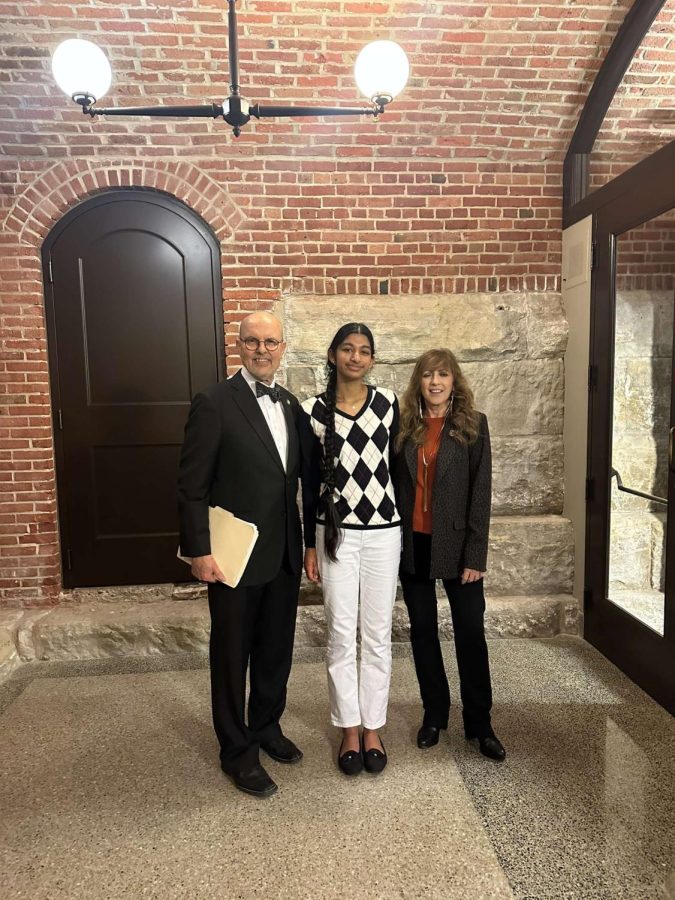Independent study leads to child labor protections
photo courtesy of Shreya Nallamothu
Sophomore Shreya Nallamothu worked with Senator David Koehler to craft and pass legislation protecting child influencers from parental exploitation.
April 25, 2023
In the Illinois State Senate, a child influencer bill has recently been passed which would protect children from being exploited by their parents on social media.
With inspiration from a child actor law put into place in the 1930s, this bill will protect children so they aren’t negatively impacted by this new age of social media. The potential bill would require that the children would receive a portion of the money that their parents made off of the video. This portion would be determined by what percentage of the video the child was featured in. The money would then go into a trust fund that the child would be able to access when they are 18.
“[Child influencing] has become a phenomenon,” Senator David Koehler said. “The prevalence of social media has allowed parents to make videos featuring their kids for hits.”
This bill would never have come to the attention of Illinois State legislation without the work of sophomore Shreya Nallamothu (Nala-ma-thoo). During quarantine in 2020, Nallamothu spent a lot of time scrolling through social media and found several examples of this type of exploitation which is what inspired her to begin researching.
“If I’m scrolling through Tik-Tok or YouTube I often see videos of these really young children with their entire lives being filmed,” Nallamothu said. “I sort of fell down that Youtube rabbit hole, and I wanted to see if there were any protections in place about the serious exploitation that was happening.”
During her research process, Nallamothu had several meetings with attorneys to see if this bill could possibly be passed. After the positive feedback she received, she began the next steps to create this piece of legislation through an independent study. As her sponsor for this study, Nallamothu chose her freshman world studies teacher, Morgan Schmidt.
“Children are my livelihood,” Schmidt said. “I care about children, I’m in their world, I teach them, and I also know how addicted they are to social media so I thought we should protect these people.”
By having a sponsor, Nallamothu was provided with an “echo chamber,” for her ideas, Schmidt said. Schmidt gave Nallamothu an organizational structure to follow each week of her study as well as helped her troubleshoot through the multiple drafts of her bill.
“She [Nallamothu] is a go-getter,” Schmidt said. “Anything that Shreya wanted to do, she was going to do it. Not saying that it was going to be easy, but I knew working with her would be enjoyable.”
As well as working with Schmidt, Nallamothu knew she needed the support of state government officials. After many emails, Nallamothu was able to get in touch with Illinois Senator David Koehler and members of the Illinois labor committee to contribute to this bill.
“The process is a lot of emailing and following up,” Nallamothu said. “It is difficult especially when you are trying to schedule a meeting, but I wouldn’t say it’s impossible.”
When Koehler received Nallamothu’s bill, he wanted to work on it immediately by comparing it to a similar bill that didn’t pass in Washington state.
“Our staff looked at Washington state where they are trying to do the same thing,” Koehler said. “Their legislation consisted of two parts. The first part included that they had to set up a trust fund and the second part was that when a child turns 18 they have the right to go back and erase videos off of the internet. We took that out of our bill because that involves consumer protection and we only wanted to deal with the child labor aspect.”
As soon as a team of experts finished the final draft of Nallamothu’s legislation, it was then sent to the Illinois labor committee where Nallamothu went in person to testify for the committee when they were deciding whether or not to send the bill to the senate floor.
“I was able to be up close and see how the legislative process really works which was amazing,” Nallamothu said. “It is so much better than learning about it from a classroom.”
Since the bill has recently passed in the Senate, the next step is for the bill to be voted on in the Illinois House of Representatives. Senator Koehler is positive that the legislation will pass in the House which would send the bill to the governor of Illinois hopefully to be signed into law.
“[The bill] has reinforced my belief that good ideas come from all places and from your constituents,” Koehler said. “All you need to do is just listen.”
